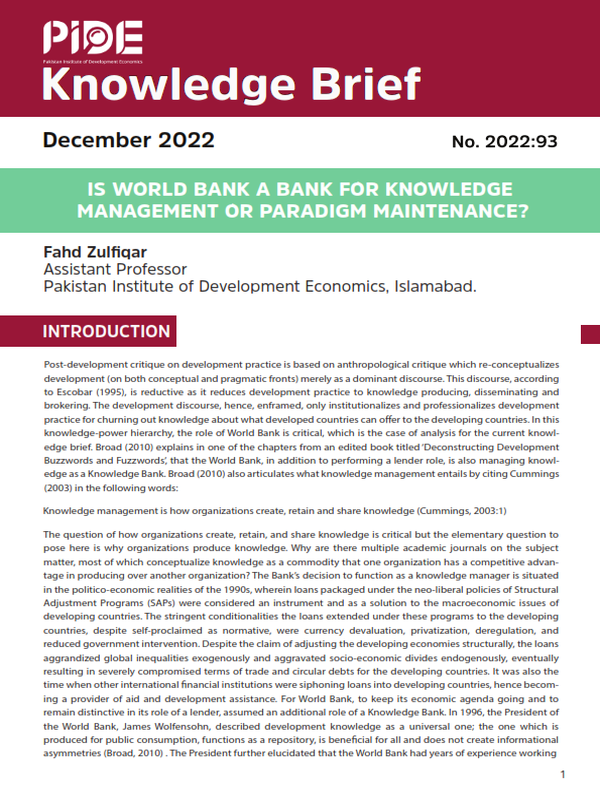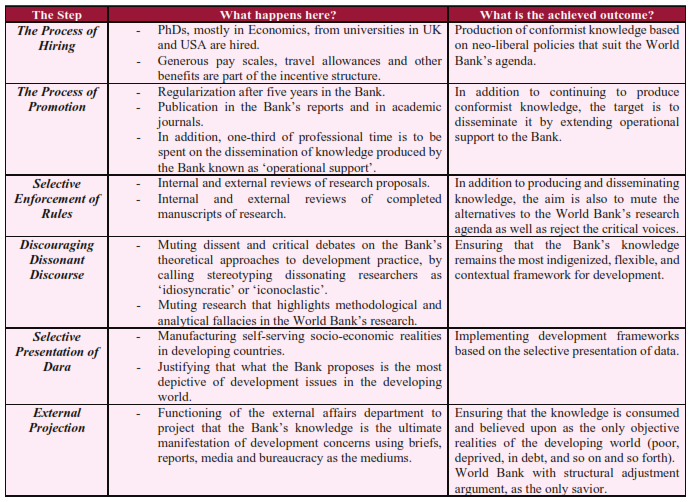
Pakistan Institute of Development Economics
- Home
Our Portals
MenuMenuMenuMenuMenuMenuMenu - ResearchMenuMenuMenuMenuMenuMenuMenu
- Discourse
- The PDR
- Our Researchers
- Academics
- Degree Verification
- Thesis Portal
- Our Portals
Is World Bank a Bank for Knowledge Management or Paradigm Maintenance?
1. Introduction
Post-development critique on development practice is based on anthropological critique which re-conceptualizes development (on both conceptual and pragmatic fronts) merely as a dominant discourse. This discourse, according to Escobar (1995), is reductive as it reduces development practice to knowledge producing, disseminating and brokering. The development discourse, hence, enframed, only institutionalizes and professionalizes development practice for churning out knowledge about what developed countries can offer to the developing countries. In this knowledge-power hierarchy, the role of World Bank is critical, which is the case of analysis for the current knowledge brief. Broad (2010) explains in one of the chapters from an edited book titled ‘Deconstructing Development Buzzwords and Fuzzwords’, that the World Bank, in addition to performing a lender role, is also managing knowledge as a Knowledge Bank. Broad (2010) also articulates what knowledge management entails by citing Cummings (2003) in the following words:
Knowledge management is how organizations create, retain and share knowledge (Cummings, 2003:1)
The question of how organizations create, retain, and share knowledge is critical but the elementary question to pose here is why organizations produce knowledge. Why are there multiple academic journals on the subject matter, most of which conceptualize knowledge as a commodity that one organization has a competitive advantage in producing over another organization? The Bank’s decision to function as a knowledge manager is situated in the politico-economic realities of the 1990s, wherein loans packaged under the neo-liberal policies of Structural Adjustment Programs (SAPs) were considered an instrument and as a solution to the macroeconomic issues of developing countries. The stringent conditionalities the loans extended under these programs to the developing countries, despite self-proclaimed as normative, were currency devaluation, privatization, deregulation, and reduced government intervention. Despite the claim of adjusting the developing economies structurally, the loans aggrandized global inequalities exogenously and aggravated socio-economic divides endogenously, eventually resulting in severely compromised terms of trade and circular debts for the developing countries. It was also the time when other international financial institutions were siphoning loans into developing countries, hence becoming a provider of aid and development assistance. For World Bank, to keep its economic agenda going and to remain distinctive in its role of a lender, assumed an additional role of a Knowledge Bank. In 1996, the President of the World Bank, James Wolfensohn, described development knowledge as a universal one; the one which is produced for public consumption, functions as a repository, is beneficial for all and does not create informational asymmetries (Broad, 2010) . The President further elucidated that the World Bank had years of experience working across Asia, Africa, Latin America, the Caribbean, and Middle Eastern and North African regions, as a result of which it has gained development knowledge based on regional connectivity. The President also highlighted the economic edge the Bank has over organizations due to the scientific knowledge, sophisticated databases, and empirical analyses it inhabits and embodies. Broad (2010) also explains that the Bank assumed four responsibilities regarding knowledge management: creating knowledge (producing the latest trends, patterns, and information on the key socio-economic issues as manufactured by the west), aggrandizing knowledge (ensuring that the knowledge produced is saved, monitored, updated, and disseminated in different formats across the board), distributing knowledge (ensuring that this knowledge is incessantly and indiscriminately distributed across developing countries till it becomes a reality), and brokering knowledge (playing an intermediary role across different knowledge producers; think tanks, ministries, regulatory authorities and universities).
2. The World Bank and Changing Lexicography of Development
The language of development has evolved over the years, and so is the World Bank’s vocabulary of development, at least at the face of it. For instance, in its formative years, the policy prescriptions were based on economic growth, aid, financial assistance, rationality, scientific knowledge, and industrialization. With inequality fuzzing in the development industry, the Bank also rebooted its economic agenda by asserting its role in reducing inequality and poverty. With inclusion, diversity and needs as the buzzwords making rounds in the development industry, the World Bank adopted normative frameworks of pro-poor, pro-people, and inclusive growth. Then, development became pro-women, later sustainable, furthermore endogenous, picked up by participatory and finally reflexive. The transient nature of development’s lexicography depicts both its rigidity as well as malleability. The malleability is illustrated by how the term can contemporaneously exist as a verb, as a noun and as an adjective.
- Development as a Verb: Development attainable by an act and action of manoeuvring economic variables; increasing or decreasing savings, investments, productivity, foreign exchange reserves, and so on and so forth. The movement of economic variables to achieve the target of attaining a certain economic output is an action-led approach to achieving development.
- Development as an Adjective: The additives which provide a peculiar lens, a specific dimension, and a dialectical approach to development. For instance, ‘colonial’ development, ‘economic’ development, ‘human’ development, ‘participatory’ development, ‘exogenous/endogenous’ development, ‘grassroots’ development, ‘inclusive’ development, ‘pro-women’ development, ‘pro-need’ development, ‘sustainable’ development… The list continues, and so is the World Bank’s receptivity towards capitalizing on these adjectives.
- Development as a Noun: The inevitability of Development as existential, as a matter of fact, and a fact of life, is what ‘development as a noun’ entails. The inescapability of the concept of Development hinges upon the developed countries, their development banks, and assistance programs, which claim to function their operations in the developing countries to serve them and ameliorate their poverty, hunger, and destitution. This make-believe approach to development is constructed by the development industry.
3. The World Bank’s Research Department: A Conformist or a Dissonant?
The World Bank’s research department develops a knowledge framework for development to be institutionalized in developing countries. This framework is based on the neo-liberal policy agenda of trade openness, free markets, deregulation, currency devaluation and privatization.
The instruments, as articulated by neo-liberal policies, are being operationalized as conditionalities to be followed by the loan-recipient countries whenever a developing country signs up to take a loan under the Structural Adjustment Programs. In this context, the lending role is pronounced, which gets accentuated when the World Bank’s research department produces research findings articulating symbiotic relationships between trade openness and poverty and trade openness and inequality. In this regard, again, Broad (2010) is cited as the author explains that the simultaneous production of knowledge, which stipulates specific results and exact replication of this knowledge across different developing countries, is not coincidental. This contemporaneous existence of knowledge production and its application is processual, as explained by Broad (2010) based on his own experience as an academic in international development and on the interviews, he conducted with the current and ex-employees of the World Bank. The author highlights six interrelated processes using which the neo-liberal agenda is set, based on which conformist development knowledge is produced and is planned to be executed in developing countries. These steps are followed to maintain a paradigm and are tabulated in the following table.
Table 1: Process of Paradigm Maintenance by the World Bank
Based on the text presented in the table above and the text preceding the table, it is deduced that the World Bank’s claim of being the ‘Knowledge Bank’ is spurious. On contrary, the intent is that of paradigm maintenance. The paradigm of neo-liberalism signifies not only the divisibility of labour in the production of economic output but also the neo-colonial division of labour in the production, distribution, and dissemination of knowledge between developed and developing countries. In such debates, the developed countries are the knowledge producers and disseminators, and the developing countries are the ones who consume this knowledge and are subservient by offering their natural and human resources when the same knowledge is implemented as a ‘one-size-fits-all-agenda’. This is the process of how paradigm maintenance is upheld.
4. Are there Still Any Alternatives?
Since the recurrent theme of the current Knowledge Brief is paradigm maintenance by the Bank, the following text details a few operable alternatives:
- The pluri-vocality of the knowledge: Since the 1990s, the hiring of anthropologists and sociologists in the World Bank has shown that the institutional and academic ways to produce knowledge are limited and have remained fallacious in the Bank. Within anthropology, there are applied anthropologists who were (still are) absorbed in the Bank and highlighted how limited the knowledge produced was. Their critiques are based on the lack of competing theoretical frameworks, methodological reductionism, and analytical lapses of the Banks’ research. Using ethnographic and ethnological approaches to development has signified research, which is depictive of experiential issues. Pluri-vocality of development practice hinges on the pluri-vocality of methodological approaches to produce knowledge.
- Simultaneous existence of multiple discourses: Conceptualization of knowledge produced which is also confined within a neo-liberal paradigm, and that too within the largest lender Bank requires the production of other forms of knowledge. Since the 1990s, more so with Arturo Escobar’s book, ‘Encountering Development: The Making and Unmaking of Development’ (published in 1995), development has been reconceptualized as a ‘Discourse’ as the source of perpetuating discursive inequalities. For the expansive consumption of this discourse, widespread dissemination is also critical, for which the Bank plays an instrumental role. Today, alternative critical voices exist that encourage dissonant discourses.
- Antithetical realities: In addition to critical voices, the simultaneous re-production of realities grounded on robust empirical data, which has been generated using constructivist ontological positions, is also the need of the hour. One such academic piece was written by PIDE titled, ‘The assumed shortage of housing in Pakistan’. The document criticizes the World Bank’s estimated shortage of 10 million housing units in Pakistan. The research also questions about how these numbers are produced, what research goes into producing such numbers, and how these spurious numbers shape the future line of policy action in Pakistan.
References
Andrea, Cornwall. and Rade, Deborah. (2010). Deconstructing Development Discourse: Buzzwords and buzzwords. Practical Action Publishing and Oxfam GB.
Broad, Robin. (2010). Knowledge management: A case study of the World Bank’s Research Department. Published in Deconstructing Development Discourse: Buzzwords and buzzwords, Andrea, Cornwall. and Rade, Deborah. Practical Action Publishing and Oxfam GB.
Cummings, Jeffrey. (2003). Knowledge sharing: A review of the literature. World Bank Operations Evaluation Department.
Escobar, Arturo. (1995). Encountering Development: The Making and Unmaking of the Third World. Princeton University Press: Princeton, New Jersey.
Nayab, Durre. (2021). The assumed shortage of housing in Pakistan. PIDE.




